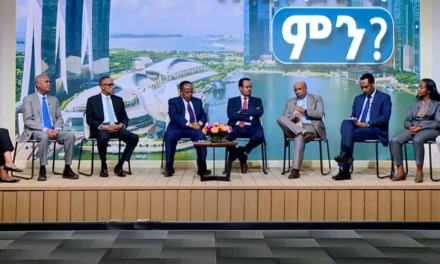Addis Ababa, Ethiopia (ESAN TV)– Key figures involved in the Pretoria peace negotiation offered reflections on the devastating two-year conflict and the complex process of implementing the subsequent Pretoria peace agreement. While both acknowledge that the initial outbreak may have been difficult to prevent, they suggest that the later phases of fighting could potentially have been avoided.
Redwan Hussein, representing the federal government, and Getachew Reda, representing the former TPLF leadership, appeared on Fana TV and accused the TPLF leadership of trying to derail the peace accord.
Redwan Hussein repeatedly stressed his belief that while the conflict’s genesis was perhaps unavoidable, its continuation into the second and third phases was not. Getachew Reda concurred, noting that discussions took place during these later rounds, involving both himself and Redwan Hussein on multiple occasions. He reflected with regret that had they utilized the options available during these later stages, the immense loss of life, destruction of property, and hardship faced by survivors might have been averted. Getachew Reda admitted that it is not difficult to believe that if he had “swallowed his pride a little and crossed over,” the later destruction could have been prevented.
Efforts were reportedly made to prevent the conflict and its escalation. Redwan mentioned that friends and individuals made efforts beforehand. Significantly, secret meetings were held for a considerable period prior to the Pretoria agreement specifically aimed at stopping the conflict. However, Redwan maintained that the initial outbreak was unavoidable. Both expressed deep regret over the immense destruction and loss that occurred, emphasizing the need to learn from the past.
A central tenet of the Pretoria peace agreement, according to Redwan Hussein, is the requirement for the former TPLF leadership to operate within the bounds of Ethiopia’s constitution and laws. A crucial step to enable this legal return was the removal of TPLF from the federal government’s list of terrorist organizations, which Parliament undertook swiftly. Once removed, TPLF is expected to function legally under the National Electoral Board (NEBE), adhering to its regulations like any other political party, including requirements for holding congresses. Redwan Hussein stated the federal government’s role after lifting the designation was to facilitate TPLF’s return to legal status.
However, Redwan Hussein explicitly stated that the Pretoria agreement does not imply federal government recognition of TPLF’s previous regional government or the election it conducted outside the federal constitutional framework, as that election had been annulled by NEBE before the agreement was signed. He highlighted a perceived contradiction where some elements within TPLF are now challenging the requirements of operating under NEBE, despite their representatives signing the Pretoria document. He mentioned that the TPLF chairman reportedly engaged with NEBE to understand the requirements and received documents, but this process was later reportedly rejected by others, reigniting arguments. He refuted the claim that they “handed over the government” by signing Pretoria, stressing the prior annulment of their election. The negotiation process itself saw a shift from the federal government’s initial demand for TPLF to “surrender in 24 hours” to the eventual agreement focusing on the establishment of an inclusive interim administration.
Implementation of the peace agreement and the push for former TPLF leaders to operate legally face significant barriers, partly attributed to a fear of accountability. Redwan Hussein suggested that some individuals anticipate facing consequences for past actions or benefit from instability, including through activities like theft and human trafficking, making them resistant to the peace process. He described a force that believes it only prospers from chaos and desires continued instability if a stable situation arises.
Both Redwan Hussein and Getachew Reda alluded to internal divisions and individuals actively seeking to undermine the peace process. Redwan Hussein pinpointed a small group of three or four individuals whom he believes are holding the population hostage for their own ambitions and who benefit from chaos. Getachew Reda also noted individuals who wished for the secret meeting in Djibouti to fail and leaked information to the media, expressing shame that anyone with a sound mind would want to ruin things.
Redwan Hussein criticized the use of divisive rhetoric, such as pitting “Tigray” against “Ethiopia,” and remarked on the absence of the Ethiopian flag in some contexts, including reportedly from the temporary administration president’s office. He believes this divisive view is held by only a narrow group, not the majority of the Tigray population, citing the fact that displaced people from Tigray still seek refuge in other Ethiopian cities like Addis Ababa and Hawassa as evidence that the majority does not support separatist sentiment. He emphasized the need to build a shared national foundation and values, which he feels is currently lacking, pointing to disagreements even on national symbols like the flag.
The critical issue of returning displaced people has faced deliberate obstruction. Redwan Hussein claimed that individuals deliberately hindered the return of displaced people by insisting they would only re-enter with the military, while simultaneously lamenting the suffering of the displaced. Getachew Reda also mentioned the return of the displaced as a key unimplemented task.
Reflecting more broadly on leadership and politics, Redwan Hussein underscored the vital need for leaders and political parties to evolve and adapt, stating that old knowledge and perspectives become obsolete for the current generation. He argued that a party failing to change, even its language, becomes irrelevant to the youth. He defined political maturity as the capacity to tolerate challenging ideas or criticism without resorting to force. Resistance to new ideas, he explained, makes one “reactionary,” stemming from a fear of change and a desire to cling to familiarity. Leaders unable to tolerate dissenting views, even if perceived as offensive, and who resort to force, are ineffective.
Redwan Hussein called for breaking the cycle of conflict and personalizing political disagreements. He stressed the importance of admitting when one is wrong, learning, growing, and discarding outdated ideas to make space for new ones and accept input from others. He urged prioritizing the collective interest over personal frustration or ambition. He viewed the Pretoria agreement as an opportunity that must not be squandered by resorting to force, criticizing those who advocate for peace being labeled “warmongers”. He saw attempts to physically remove individuals advocating for peace as nationally dangerous.
The interview painted a picture of a peace process fraught with challenges from within, driven by personal interests and a fear of accountability, despite the expressed desire by some key figures to move beyond conflict and build a more tolerant and unified future for Ethiopia.








